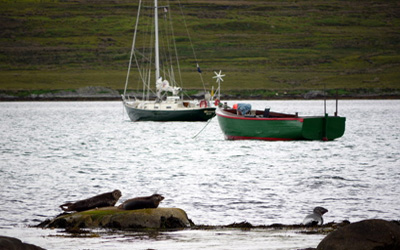Jeremy Malies on Jura: The hotel, distillery, library

Photo credit: geograph.co.uk/Wikipedia
The first hamlet north out of Craighouse is Knockrome whose wonderfully named Lowlandman’s Bay curls round on itself so that it’s almost enclosed. There are a surprising number of palm trees here, and the tropical feel is reinforced by red hot poker plants, also known as torch lilies. They taper from Kodak yellow to rock candy red, could almost be imagined as a torture instrument and seem to ooze heat. I make for a red telephone box surrounded by harebell and helleborine that serves as a library for the island. Even at a distance, the books reveal themselves to be mostly pulp fiction. Will there be anything by Orwell, about him, or of possible interest to his shade?
A “BBC Active Talk” Spanish course complete with cassette tapes (would anybody be able to play them now?) is the first thing I pick up. In Homage to Catalonia, Orwell belittles his ability with the language, saying that he would stitch together pidgin sentences from a Hugo’s dictionary when asking his sergeant to demonstrate use of a machine gun. My bet is that he was proficient and would also have fared well with Catalan which is even closer to French and Latin. The books are not just low-brow, they are largely junk as though there has been some genteel fly-tipping. The best of them include Andrew Marr’s The Making of Modern Britain which has an index. I read Marr’s summation: “Orwell was a strange fish, but he was right about the big things, and his assertion that the workers of Britain were more likely to carry on dreaming of horses coming in at twenty to one, and moan over their tea, than revolt was proved spot on.” This sounds like the pastimes provided for the proles in Nineteen Eighty-Four.
Focused on our man, my teetotal companion Wensleydale (“Wens” from now on) drives the Merc straight past the barn-like structures that make up the Lussa Gin distillery at Ardlussa. Why is gin so sexy these days? I’m a reformed alcoholic, with gin having done much of the damage. All true alcoholics will tell you that once addiction kicks in, anything from Dom Pérignon to White Lightning cider is simply fuel. The Lussa Gin website details many awards, so you have to reckon that the products are better than the woeful Victory Gin that Winston swills (often to relieve pain) in the novel. It’s news from the settlement here that makes for the most unpleasant and revealing entry in Orwell’s diaries. “June 12, 1947. Five rats (2 young ones, 2 enormous) caught in the byre during about the last fortnight … I hear that recently two children at Ardlussa were bitten by rats (in the face, as usual.)”
The route gives us a view of Ardlussa House, a baronial-style stalking lodge owned by the Fletcher family who were Orwell’s landlords. The terrain has opened up a little now into broad sweeps with russet tones. As a resident of the lodge, you can stalk deer and fish the Lussa river. You don’t get to keep the venison which is sent to London restaurants, but you can keep the head. Another time perhaps; it would be a tough item to bring through Gatwick with my EasyJet hand luggage. I think this and the Jura Hotel are the only hotels on the island unless you are playing golf at Ardfin.
It’s a mandatory four-mile walk each way to Barnhill, the previously abandoned farmhouse that Orwell rented in 1946 from Margaret Fletcher. She was the husband of Robin Fletcher who had been a housemaster and classics teacher at Eton in the 1930s. The BBC had the sense to do an “Arena” series on Orwell sufficiently early (1983) to record first-hand recollections, and the programmes are on YouTube. Margaret speaks to camera about the writer’s gaunt appearance and what she took to be sadness at being a recent widower. Robin Fletcher spent the war as a prisoner of the Japanese in Burma, mastered his captors’ language within six weeks, and showed courage both on the railway and at Changi Prison. Burma and Eton links must have made for conversation between the men.


